'This is where I need to be’ - Stevie Wonder becomes Ghanaianpublished at 15:15 BST 14 May 2024
The American music icon has long been an admirer of the west African country.
Read MoreThis is an automated feed
The American music icon has long been an admirer of the west African country.
Read MoreBBC Newsday
World Service radio
Aid agencies in the Darfur region of Sudan say they are facing a catastrophe following four days of intense fighting in the city of El Fasher.
Claire Nicolet, head of emergency response for medical charity Médecins Sans Frontières (MSF), said clashes between the army and a rival paramilitary force had been dramatic, with civilians the main casualties.
She said it had made the task of getting much-needed supplies into the city and surrounding camps almost impossible.
"One of the main issue was supply, specifically foods and prices are completely crazy. Unfortunately with the current situation, moving trucks around will be even more difficult," she said.
She explained that if the fighting continued, the number of people suffering malnutrition would rise to unprecedented levels - "around two to three million".
"Already the nutrition situation was catastrophic. You can unfortunately imagine that if the current situation continues we will see lots of death unfortunately."
After a decades-long love affair with Ghana, the US musical icon is granted citizenship.
Read MoreThe former apartheid regime said Chief Luthuli died in an accident after a train hit him in 1967.
Read MoreSouth Africa's unemployment rate rose to 32.9% in the first quarter of the year, the national statistics body announced two weeks before the country goes to the polls.
It signals an increase of 0.8% from the last quarter of 2023.
South Africa has one of the highest unemployment rates in the world.
One in two young South Africans is unemployed and 60% are living below the poverty line.
Stubbornly high unemployment, corruption and persistent economic inequalities are some of the dominant election issues.
Voters have mounted criticism of the handling of the economy by the governing African National Congress (ANC) party, which has been in power since the end of white-minority rule in 1994.
Some polls suggest the party could get less than 50% of the vote for the first time.
Read more:
 BBC Monitoring
BBC Monitoring
The world through its media
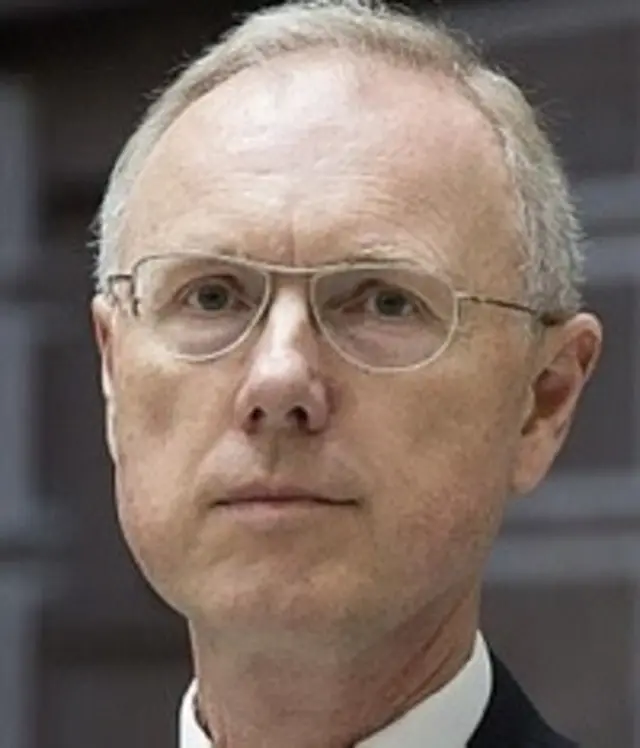 Image source, Russian Embassy in Mozambique
Image source, Russian Embassy in MozambiqueThe cause of Alexander Surikov's death remains unclear
The Mozambican government has said it was working with authorities in Moscow to investigate the circumstances surrounding the death of the Russian Ambassador Alexander Surikov.
Surikov, 68, was found dead on Saturday night at his official residence in the Mozambican capital, Maputo, local media reported.
The cause of his death remains unknown.
The office of Mozambique’s public prosecutor has said that it was unaware of the alleged refusal by Russian authorities to conduct an autopsy on the body of the ambassador as reported by local media.
In a statement, President Filipe Nyusi said Surikov's death left a "huge void", describing him as a dedicated diplomat with exceptional qualities, local media reported.
Surikov was appointed to the position in 2017.
The world’s longest cruise has been forced to amend its route and is now calling at nine African ports.
Read More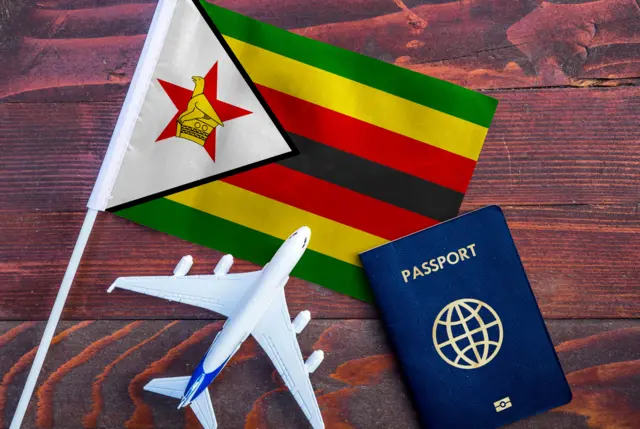 Image source, Getty Images
Image source, Getty ImagesThe move has been criticised by some Zimbabweans
Zimbabwe citizens will continue paying passport fees in US dollars, despite the introduction of a new currency last month, the deputy finance minister has said.
David Kuda Mnangagwa said on Monday that there was a pre-existing agreement between the government and the Lithuanian passport printing company, Garsu Pasaulis, for the passport fees to be charged in dollars.
Zimbabwe introduced a new gold-backed currency called Zig - the name stands for "Zimbabwe Gold" - in an attempt to stabilise its ailing economy.
It replaced the Zimbabwean dollar, the RTGS, that had lost three-quarters of its value so far this year.
The move to continue charging passport fees in dollars has sparked criticism in the country, with some Zimbabweans saying it portrays lack of confidence in the new currency.
"As long as the Zig is not accepted by its issuer, the government, it will soon become worthless," prominent journalist Hopewell Chin'ono said on X (formerly Twitter).
Zimbabwe's government increased the passport fees to $200 (£160), up from $120 last December.
Read more:
 The Newsroom
The Newsroom
BBC World Service
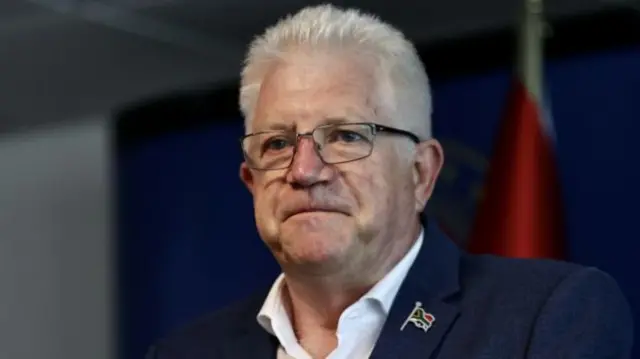 Image source, Getty Images
Image source, Getty ImagesWestern Cape Premier Alan Winde says the rescue operation is proceeding layer by layer
The premier of Western Cape province in South Africa has said he will not give up hope of pulling more survivors from the rubble of the five-storey building that collapsed in the city of George eight days ago.
Alan Winde said the rescue operation was proceeding layer by layer to ensure the safety of anyone still trapped alive.
About 20 people are still missing, though Mr Winde said the presence of subcontractors at the site meant he still was not certain about numbers.
Thirty-two people are now known to have died.
No-one has been rescued since Saturday, although Mr Winde said past experience from earthquakes demonstrated that people could survive under rubble for extended periods.
Read more:
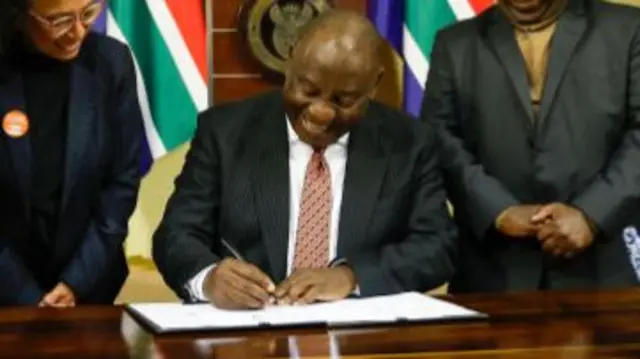 Image source, Getty Images
Image source, Getty ImagesThe bill aims to provide healthcare to millions of poor citizens (file photo)
South Africa's President Cyril Ramaphosa is due to sign into law a contentious national health bill that aims to provide universal coverage to millions of poor citizens.
The National Health Insurance (NHI) bill seeks to give South Africans “of all races, rich or poor and legal long-term residents, external” access to quality healthcare.
It was passed by lawmakers last year and is set to be implemented in stages at a cost of billions of dollars.
The opposition parties and civil society groups wanted the bill to be referred back to parliament, saying it was flawed in its current form.
The bill will be signed into law on Wednesday at the Union Buildings, the presidential office, in the capital, Pretoria, the presidency said, external.
It comes just days before the 29 May national election that could test the ruling African National Congress' 30-year rule.
South Africa is still considered one the most unequal societies in the world, with a huge wealth gap and 84% of South Africans relying on often poor quality public healthcare.
 Yemisi Adegoke
Yemisi Adegoke
BBC News, Lagos
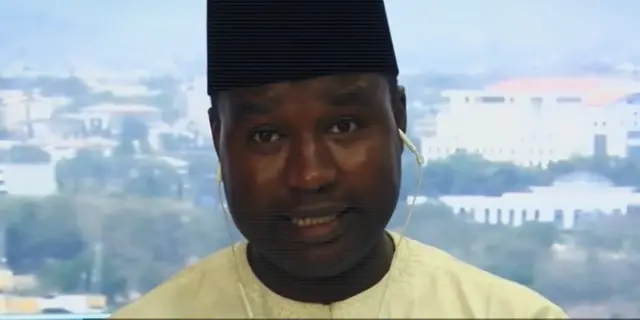
Mubarak Bala's arrest in 2020 sparked international outrage
Mubarak Bala, a Nigerian atheist who was sentenced to 24 years in prison for blasphemy related charges in 2022, has had his sentence reduced to five years on appeal.
According to Bala's lawyer, James Ibori, a panel of three judges in Kano state ruled that the original sentence was "excessive" and "against the provisions of the law".
It is unclear when Bala, who has been in prison for four years, is likely to be released.
His case sparked international outrage when he was arrested in 2020.
A group of Muslims had filed a petition to the authorities accusing Bala of posting uncomplimentary messages about Islam on social media.
He later pleaded guilty to all 18 charges and was sentenced to 24 years in prison by a high court in the Muslim majority northern state of Kano.
There have been widespread calls for Bala's release and his detention has incited fears about freedom of speech in Nigeria.
Read more:
 Image source, Getty Images
Image source, Getty ImagesThe president also wants fuel-run generators phased out
Nigeria's President Bola Tinubu has ordered all government agencies to purchase only vehicles powered by natural gas as part of the country's efforts to transition to cleaner energy and cut high fuel costs.
In the directive issued on Monday by presidential spokesman Ajuri Ngelale, Mr Tinubu said he expected all government departments and agencies to start disposing of all petrol or diesel-powered vehicles going forward.
All new government vehicles, generators, or tricycles must utilise compressed natural gas (CNG), solar power or be powered by electric energy sources, the president added.
President Tinubu expressed his commitment to effectively harness the country's gas potential to alleviate the burden of high transportation costs on the masses.
The directive comes a few weeks after the government announced plans to roll out more than 2,000 gas-powered buses and tricycles in an effort to slash transportation costs before 29 May, when President Tinubu turns one year in office.
Nigeria holds Africa’s largest gas reserves but they are under-utilised due to inadequate processing facilities.
The US Embassy in Tanzania has closed for two days because of an internet outage affecting several East African countries.
"Due to degraded network service nationwide, the embassy will remain closed to the public," the embassy said in a post on X (formerly Twitter) on Monday., external
It cancelled all consular appointments for Tuesday and Wednesday and rescheduled them to a later date.
The embassy will, however, remain accessible for visa collections and for handling emergency cases involving American citizens.
The internet outage has persisted since Sunday morning, causing poor connectivity in Tanzania, Kenya, Rwanda and Uganda.
Metrics shared by internet monitoring group NetBlocks, external on Monday showed that Tanzania has been worst hit by the outage.
The patchy service was a result of faults in the under-sea cables that connect the region to the rest of the world through South Africa, industry expert Ben Roberts told the BBC.
On Monday, some East Africans were still experiencing slow internet speeds with some telecom providers indicating that the issue was yet to be fully resolved.
Read more:
Our African proverb of the day:
Quote MessageA road cannot tell you that there is a misfortune ahead."
A Luhya proverb sent by Musonge Mutoro Godfrey in Bungoma, Kenya
South African Delvin Safers had already made what he thought was his last phone call to his family.
Read MoreIn 1897 British colonial forces attacked and looted the ancient Kingdom of Benin in what is now southern Nigeria. Thousands of precious objects were taken, including stunning sculptures made of bronze, brass, ivory and terracotta. Some were decorative, some were sacred. Known collectively as the Benin Bronzes, they were famed for their craftsmanship and beauty. The majority ended up in museums around the world. But ever since, Nigerians have been demanding their return. The Bronzes became symbols of the wider global campaign for restitution by former colonial powers. Now finally, some have been handed back. Peter Macjob travels to Nigeria to track the return of the Bronzes, and find out what it means for Nigeria to have these lost treasures come home.
Photo: One of the repatriated Benin Bronzes currently held at a secret location in Nigeria (BBC)
Reporter: Peter Macjob Producer: Alex Last Sound mix: Neil Churchill Production Coordinator: Gemma Ashman Series Editor: Penny Murphy
The heads of the Tunisian swimming federation and the national anti-doping agency were detained on Saturday.
Read MoreWe'll be back on Wednesday morning
That's all from the BBC Africa Live team for now.
There will be an automated feed here until Tuesday morning - and you can get the latest news on our homepage.
You can also listen to our podcasts: Africa Daily and Focus on Africa.
A reminder of Monday's wise words:
Quote MessageInside a black pot, white pap is made."
A Yoruba proverb sent by Aina Ayodeji Kazeem in Ibadan, Nigeria
Click here to send us your African proverbs.
We leave you with this image of pupils in Nairobi, Kenya drying out their damp books. They returned to school on Monday after deadly flooding disrupted their studies.
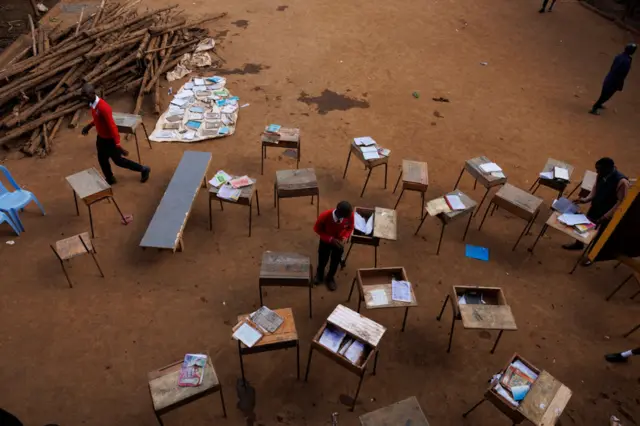 Image source, AFP
Image source, AFP Rafieka Williams
Rafieka Williams
BBC News, Johannesburg
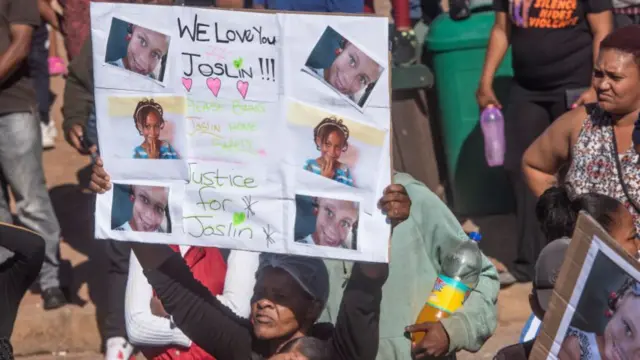 Image source, Getty Images
Image source, Getty ImagesJoshlin Smith's disappearance has shocked many people in South Africa
The mother of missing six-year-old Joshlin Smith has made her latest appearance in a South African court on charges of kidnapping and trafficking her daughter.
Racquel "Kelly" Smith stood in the dock for a short while, before the magistrate postponed the case until 15 July in order to give police more time to continue with their investigations.
Police have failed to achieve a breakthrough in the search for Joshlin, almost three months after she went missing from outside her home in Middelpos, a neighbourhood in the south-western Saldanha Bay region.
The police have denied accusations, levelled by the local community, that they have failed to conduct a proper investigation.
Police told the magistrate they were conducting a forensic analysis of mobile phone data as part of their search for Joshlin.
Ms Smith has been charged along with her boyfriend, Jacquen "Boeta" Appollis, and two other people.
They have not yet been asked to plead.
The magistrate remanded the four suspects in custody until the next court appearance on 15 July.
Read more:
Ameyu Etana
BBC Afaan Oromoo
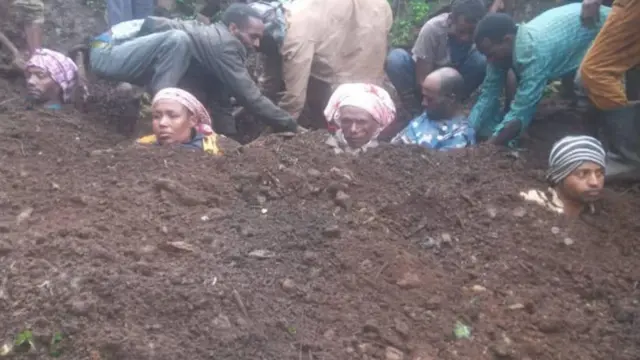 Image source, Abas Muktar
Image source, Abas MuktarBurying someone after they survive a lightning strike is said to restore their health
Twelve people in eastern Ethiopia who survived a lightning strike were buried up to their necks for around two hours in accordance with local customs.
The incident occurred on Sunday in Melka Bello, a town around 450km (280 miles) from the capital, Addis Ababa.
"It was not heavy rain as such. The lightning struck a sheep at the door while we were inside a house. All of us fell down. Many of us were shaking," survivor Nesro Abdi told the BBC.
Locals who heard screaming rushed to help.
"They brought milk and poured it on us. They dug up the ground and buried our bodies below our necks," Mr Nesro said.
In Ethiopia’s central region of Oromia, it is widely believed that if someone survives a lightning strike, burying them in soil and giving them milk to drink or pouring milk on them will restore their health.
Lightning is seen as an act of God - when it occurs, people celebrate so as not to offend the Almighty.
Mr Nesro said: “As I couldn't move my legs before, people had to carry me and put me in the soil. But when we got out of the soil, everyone is feeling better. I am moving well now."
Haftu Birhane, an environmental physics researcher at Haramaya University, warns against these traditions as they are not scientifically proven.
"What science advises is to take [survivors] to the nearest health facilities,” he said.